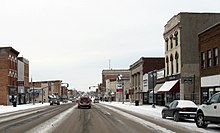U.S. Route 136 in Iowa
While it was designed for wagons and early automobiles, crossing the rail bridge became difficult in larger modern vehicles, specifically semi trucks.
[3] Entering the town from the west along 7th Street, the highway passes between two pillars which mark the northeastern corner of Rees Park.
[4] The routes continue east past an old school which hides the city's 4-million-US-gallon (15 ML) water tower.
The 160-foot-high (49 m) tower was the second largest elevated storage tank in the United States when it came online in December 2011.
[5] It then crosses a bridge which connects two bluffs, underneath which a single line of the Keokuk Junction Railway passes.
[6] The routes descend a hill as they head towards downtown; they climb another until the intersection with Main Street.
The business route turns to the northwest onto US 218 which begins its 320-mile (510 km) journey northward.
[10] Ten years later, War Eagle, a river steamer sank after it collided with a fixed span of the bridge.
South of downtown, it replaced Iowa 161, which crossed the Mississippi River on the Keokuk Rail Bridge.
The western terminus of the bridge featured a curve which was navigated easily by wagons and early automobiles, but was dangerous for semi trucks.
[16] Governor Terry Branstad was convinced a new bridge was needed after riding in a railcar to view the underside of the road deck.

